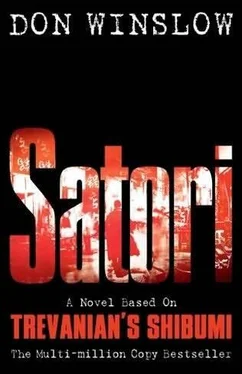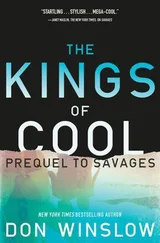Nicholai walked past a rather surprising bronze statue of Napoleon to the reception desk.
“Monsieur Guibert?” The métis clerk smiled. He had received a call from Bay Vien himself and was appropriately obsequious. “Welcome to the Continental. It is our pleasure to have you.”
“Thank you.”
“Your room is ready,” the clerk said. “And Monsieur Mancini invites you to have a drink with him, if it is convenient for you. In the bar? Six o’clock?”
“Please relay my honored acceptance,” Nicholai said. Signavi had apparently wasted no time informing his Corsican colleagues of his arrival in the city.
Mathieu Mancini had come to Saigon after World War I, married a wealthy Vietnamese woman, and bought the Continental. Reputed to be the head of L’Union Corse, the Corsican mafia, in Saigon he was a confidant of Bao Dai’s.
And a friend to Bay Vien.
A bellhop took Nicholai to his room on the fourth and top floor. It was large and high-ceilinged, with whitewashed walls and simple but elegant wooden furniture. French doors opened onto a small, private balcony behind iron grillwork. A ceiling fan circulated the humid air, providing some relief.
Nicholai tipped the bellboy and then was glad for some privacy and solitude. He called room service for an iced beer, drew a steaming hot bath, and luxuriated in it for half an hour.
It was good to be in a city again and experience some luxury and sophistication that he hadn’t known since Shanghai. The contrast between the near-scalding water and the cold beer was a sharp delight, and Nicholai allowed himself to give in to the realm of the senses for a few minutes.
Then he evaluated the Go board.
He had advanced his position. I’m safely out of China, he thought, have funds – or will have tomorrow – and am in Saigon with Bay Vien as a patron and protector.
Good and good.
And Solange is likely somewhere in the city.
Better.
But my position is nevertheless precarious.
Haverford is sitting in the bar across the street, apparently unconcerned with being discovered. He knows I’m alive and where I am. Beijing and Moscow will soon know, if they don’t already, and might well send people to kill or kidnap me. Of the two, the Chinese are the greater threat as the Russians will have a problem getting agents into Saigon.
The “Guibert” cover has a short life. I need a new identity, and quickly, if I’m ever to get out of Saigon. And before I leave, I have things to accomplish.
But all that is several moves off, he reminded himself. The next part of the game is to see what Mancini wants.
The Corsican greeted him warmly.
“Monsieur Guibert,” Mancini said. He kissed Nicholai on both cheeks, patted him on the shoulders, and continued, “Welcome, welcome.”
Mancini smelled of cologne and tobacco.
“Thank you, Monsieur Mancini.”
“Call me Mathieu, please.”
“I’m Michel.”
The Continental’s owner was short but looked immensely powerful, barrel-chested with the big, sloping shoulders of a former boxer. A few strands of silver glistened at the temples of thick black hair that was slicked straight back. His off-white cotton suit and monogrammed white shirt were beautifully cut, and he saw that Nicholai noticed.
“I’ll introduce you to my tailor,” Mancini said. “Vietnamese guy at the ‘Botany’ shop, just down Catinat.”
“I would appreciate that.”
“You’re new to Saigon?”
“First time here.”
“You’re in for a treat,” Mancini said. “It’s a beautiful city, beautiful. So many pleasures on offer.”
And which, Nicholai wondered, are you going to offer me?
“Pastaga? ” Mancini asked, using Marseille slang for pastis. He searched Nicholai’s eyes for any blink of incomprehension.
“I could do with a pastis,” Nicholai answered. Solange had covered the word with him many times and familiarized him with the thick yellow liqueur, a close cousin of absinthe.
“Ah, you’re from the south,” Mancini said.
“Montpellier,” Nicholai said, deciding to end the honeymoon. “But you knew that already.”
“I know everything, young man,” Mancini said amiably. “Come on, then. I won’t insult you with the crap we serve the colons. The real stuff is out here.”
As he led Nicholai out of the bar into a private garden, Mancini said, “Me, I’m from Corsica originally. But you already knew that. Did you also know that Corsicans make the best assassins in the world?”
“Is that right?” Nicholai answered. He wondered what the ninja might have to say about it.
“Take it as a fact.”
And a warning, Nicholai thought.
They walked into a narrow strip of garden where several older men sat around two white wrought-iron tables. The men all wore white short-sleeved shirts and either white or light khaki loose-fitting trousers. A couple of them sported broad-brimmed hats for protection against the sun.
Nicholai knew that he was looking at L’Union Corse.
Mancini took off his jacket, draped it on the back of a chair, sat down, and gestured for Nicholai to do likewise.
“This is my newest guest,” Mancini said as Nicholai took a chair. “Michel Guibert.”
He introduced each of the five men – Antonucci, Guarini, Ribieri, Sarti, Luciani – each of whom offered a hand with a gruff nod. Mancini filled Nicholai’s glass with pastis. The men looked on as Nicholai took the carafe of water set on the table and poured some in to dilute his drink. Then he raised the glass, said, “Salut,” and sipped. His familiarity with the pastaga seemed to relax the group, who sat back in the chairs, drank, and took the sun.
“So,” Mancini said, “what brings you to Saigon?”
“Business,” Nicholai answered.
“How is your father?” asked Antonucci.
Antonucci looked to be in his early fifties, and was as skinny as Mancini was stout. But the deeply tanned forearms under his rolled-up sleeves looked like iron, and despite his casual but expensive clothes, the man looked like he could be a day laborer.
“He’s well,” Nicholai responded. “You know him?”
“We’ve done business,” Antonucci said. “In the past.”
“Well,” Nicholai said, raising his glass, “here’s to the future.”
They drank a round. Then Antonucci raised his glass toward Mancini and said, “To my new neighbor.”
Mancini explained to Nicholai. “After years of trying, I just managed to acquire the Majestic Hotel, next door to Antonucci’s nightclub.”
“Your nightclub?” Nicholai asked.
“La Croix du Sud,” Antonucci said, then added pointedly, “In the Corsican quarter, on the harbor. Where all the imports and exports come and go.”
“You’d like his club,” Mancini said to Nicholai. “One of those pleasures we talked about.”
“Come tonight,” Antonucci said.
“Tonight?” Nicholai asked.
Antonucci leaned across the table and looked Nicholai full in the face. “Tonight.”

A little while later, Mancini and Antonucci went out the back gate and strolled across the broad Opera Square. On the other side, the Saigon Opera House loomed in all its French colonial glory. The other Corsicans had drifted home. It was that hour, “the hour of the pipe,” and these longtime residents of Saigon had acquired many local habits.
“What do you think?” Mancini asked.
“Smart young man,” Antonucci said, pausing for a moment to relight his cigar. “Maybe we can make some money with him.”
They walked across the square, quiet now in the torpid hour before the cool of evening would bring out young lovers, old strollers, people looking for relaxation and those searching for excitement.
Читать дальше













